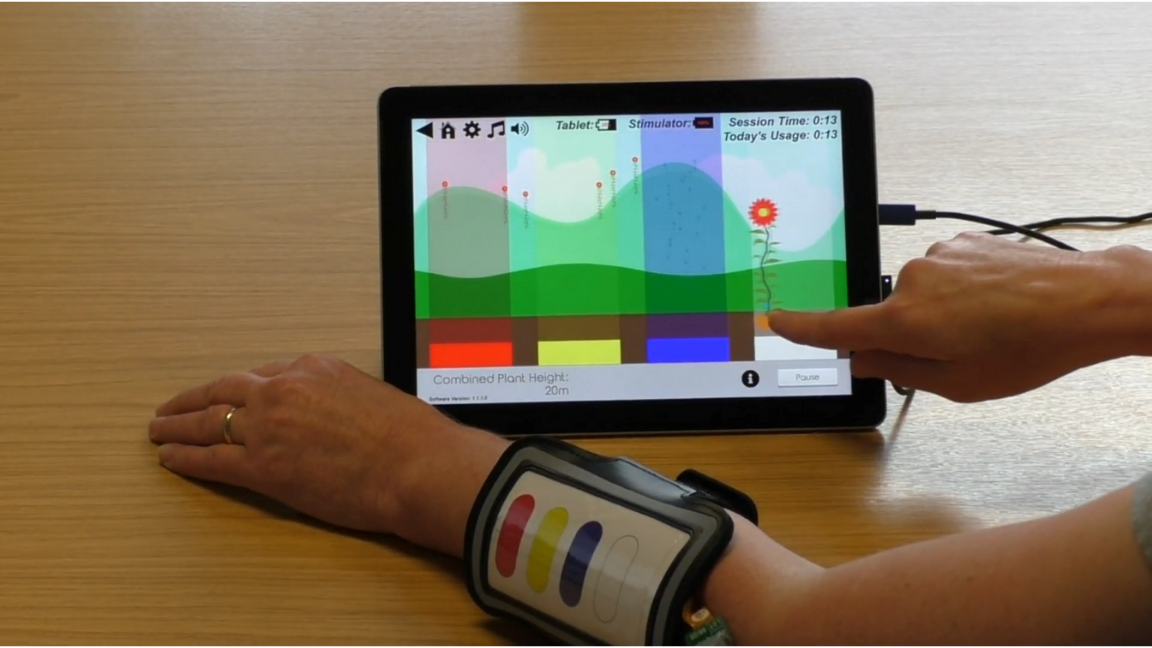
Case Study
‘Gaming’ device aims to help with persistent pain
Date: March 28, 2022
An innovative device to tackle chronic limb pain is being trialled across the UK, thanks to support from the IKC and Versus Arthritis.
The Sensory Training System aims to help patients regain a finer range of nerve sensation in their limbs, which they often lose due to constant, localised pain. While it may seem counter-intuitive, research has shown that if patients can retrain their brains to distinguish sensations in their limbs more clearly, their levels of pain will reduce.
The system involves four electrode pairs that patients wear on or close to their painful body part, as they play specially designed electronic games on a linked tablet device. The games ask them to correctly identify which electrodes are being lightly electrically stimulated as they move through a series of different scenarios. The tablet records information about the patients’ activities including time spent, levels reached, and accuracy.
The device was developed by Professor Candy McCabe, Professor of Clinical Research and Practice, at the University of the West of England and Dr Darren Hart, Principal Clinical Scientist at the Royal United Hospitals in Bath, in collaboration with colleagues at both organisations.
Increasing the range of sensations
Professor McCabe explains: “Over time, patients will have fewer neurons (nerve cells) representing these painful body parts ‘switched on’ in the brain because those neurons are effectively not having to work so hard – all they’re having to process is constant pain rather than subtle differences in sensation. If we can increase the range of the sensations that the limb and brain have to interpret, we believe that it will reduce the levels of pain for that patient.”
The games played aim to be interesting, but challenging. They include ‘Blockbuster’ where the patients need to correctly identify the active electrodes to explode falling blocks, and ‘Flower Tower’ where repeated success lets them grow flowers and plant a garden. All start off at an easy level, suitable for patients starting with poor sensory discrimination, where patients can more easily identify the electrodes that are spaced the furthest apart from each other. As each game progresses, patients must identify any one of four electrodes that are active in a random order, and at different distances from each other.
The researchers sought for and received MHRA approval for a clinical study using the redeveloped device.
Dr Darren Hart says: “We’ve tried to create an enjoyable and engaging experience for patients, to ensure they use the device for the necessary amount of time every day. Following feedback that the prototype games were repetitive and too easy, we’ve redesigned them with more levels of difficulty to keep people engaged. And now if they play the first two games for 15 minutes, it allows them to unlock a third game, so there’s also an incentive to keep at it!”
Future potential
The trial – funded by Versus Arthritis in partnership with the IKC – hopes to collect information on 20 participants across the UK using the system daily for half an hour over four weeks. The level of pain patients are feeling will be assessed before and after the month to see if there has been an improvement. While it’s a small study, if the team can prove that patients can engage with the device for the length of time that is thought to provide therapeutic benefit, they will seek more funding for future trials and commercial product development. And with an estimated one-third of the UK population suffering from persistent pain, any future device will have broad application.
The additional support provided by the IKC has also proved valuable to the team. Professor McCabe says: “We’re a small clinical academic group – we have clinical expertise and research knowledge, but not the day-to-day expertise of how devices can be developed through to commercial production. The IKC have been extremely helpful, prompting us to constantly look forward and ask ourselves: where is this heading; who should be an industrial partner; and what are the pros and cons of different funding options?”
The technology is one of two supported by the IKC Versus Arthritis partnership to enter clinical trials. The £2m funding awarded through the partnership has supported 22 projects overall, leading to two technologies being patented and two undergoing regulatory approval.
Dr Craig Bullock, Head of Discovery and Innovation at Versus Arthritis said: “Persistent pain affects up to 28 million people in the UK. Pain can affect your ability to work, care for your family and live independently and we know current treatments options are not effective for many people living with persistent pain. We’re delighted with the progress made by Professor McCabe and the research team in developing a new and innovative non-drug based approach to tackle persistent pain. The funding from Versus Arthritis and the work of the IKC is accelerating this research forward towards helping people living with persistent pain sooner.”
Back to Case Studies
